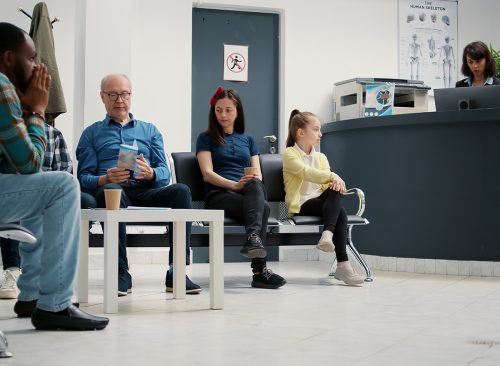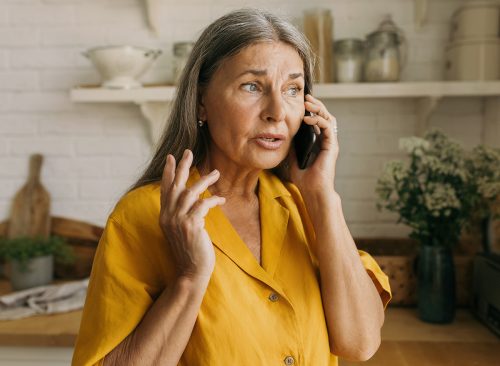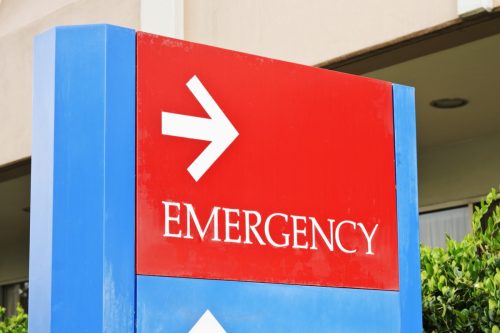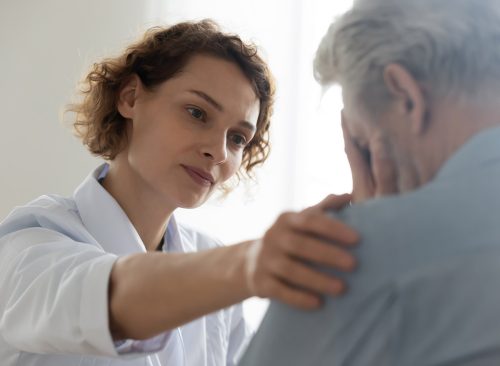7 Things You Should Never Do in an Emergency Room, Say Doctors
Here’s what doctors have to say about it.

If you’re having a medical emergency and need to go to the ER, don’t hesitate to go. That’s what it’s there for. Having said that, there are certain dos and don’ts to keep in mind, not just to help yourself but to make it easier for the doctors and medical staff who will be helping you. Keep these tips in mind and the whole process will hopefully be less stressful and more easy for everyone. Here are 7 things you should never do in an emergency room, according to doctors.

You won’t get priority in the ER by arriving in an ambulance, experts warn. “Do not assume you’ll be able to jump the line if you come by ambulance,” Michael Daignault, MD, tells USA Today. “It won’t work. And it’s a misuse of the EMS system. As with all visitors to the ER – whether you walk in or come by ambulance – you’ll be quickly evaluated by a triage nurse who will determine whether you need to be seen immediately by a doctor based on an assessment of your ‘chief complaint’ and vital signs.”

Always bring important documents with you if possible. “Many older adults have durable power of attorney for healthcare forms or other legal paperwork,” Brad Uren, MD, tells Michigan Medicine. “Plan ahead and ensure that these forms are completed. Some documents may require the assistance of an attorney or the assistance of a notary public. Having these documents completed and on file with your physician and hospital is important. Having an extra copy with you can be important as well.”

Don’t call the ER and decide whether or not to come depending on how busy it is. “Do not call and ask ‘What’s the wait time in the ER right now?’ We are not a restaurant,” Daignault says. “We have a rule: If you have to ask the wait time, you probably don’t have an emergency. Post-pandemic wait times are up to multiple hours at ERs across the country. Your time may be better spent at urgent care or use the telehealth function most insurance companies offer now.”

Keep your phone charged, or bring a charger with you. “Beyond contact information, a reality of modern life is the reliance upon our phones for other critical information,” Uren says. “Insurance details and other important documents may be referenced on our electronic devices. Keeping them charged and ready is more important than ever. While most emergency departments may have a way to help you charge your phone, I recommend bringing your own to keep it topped off.”

“If your sudden illness or injury is something you would normally feel comfortable addressing with your primary care doctor, then an urgent care center or walk-in clinic setting is probably more appropriate than the emergency room,” Shawn Evans, MD, tells Scripps Health.

A trip to the emergency room is not an opportunity to discuss non-relevant ailments. “Do focus on the reason that brings you to the ER. As much as we’d love to help you out with multiple concerns, we simply don’t have the time, staff, or resources,” Daignault says. “Please don’t be upset if your doctor asks you ‘What’s the main reason you came to the ER today?’ Or ‘What’s bothering you the most?’ We can always refer you back to your primary doctor or a clinic to assess most chronic medical concerns.”

Always tell the doctor exactly what your concerns are. “I once spent an hour evaluating an elderly patient for a concern about leg pain,” Uren says. “I was ready to discharge the patient when a family member pulled me in the hallway to tell me they were actually more concerned about the patient’s ability to live safely at home and told her to come have her leg checked. This led to an honest conversation between the patient and family during which we addressed all of the concerns and ensured the patient’s safety at home.”














